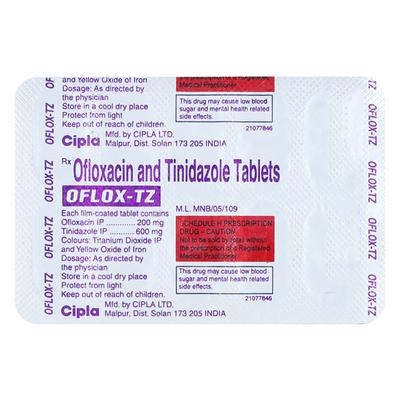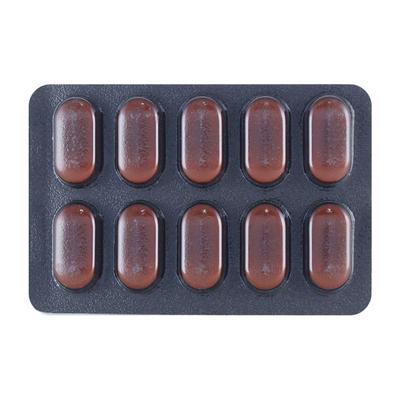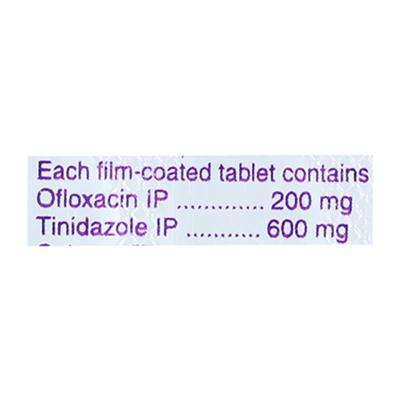

Netmeds First Membership
Quick Links
Introduction About OFLOX TZ TABLET
OFLOX TZ TABLET contains a combination of Ofloxacin and Tinidazole, which belongs to the group of antibiotic medicines called Fluoroquinolone and Nitroimidazole (anti amoebic agent). OFLOX TZ TABLET is used in the management of diseases caused by bacteria and parasites. It is used to manage diseases such as giardiasis (parasitic infection of the intestine), amebiasis (a parasitic infection causing dysentery), vaginal infection, infection in the kidney or urinary bladder, respiratory infection etc. Symptoms of infection include fever, chills, tiredness, vomit, stomach upset etc.
Ofloxacin kills and manages the growth of the bacteria by blocking DNA enzymes. Tinidazole kills and manages the growth of the bacteria by reducing the nitro group which causes DNA destruction. Your doctor may advise you to take relevant medical tests to understand your existing condition.
OFLOX TZ TABLET is not recommended for use in patients having genetic disorders (such as Cockayne syndrome, G6PD deficiency), fits or seizures, tendon muscle weakness following antibiotic management etc. Also before taking OFLOX TZ TABLET inform your doctor if have diabetes (abnormal body sugar level), abnormal blood pressure, heart disease (such as irregular heartbeat, heart attack, valve disorder, poor heart function etc.), kidney diseases (such as kidney failure or kidney injury), inflammation of the intestine, severe skin problems (such as Stevens-Johnson syndrome, toxic epidermal necrolysis, Marfan syndrome, Turner syndrome etc.), muscle-weakening diseases (such as myasthenia gravis etc.), nerve pain (neuropathy), liver disease, psychiatric illness or emotional imbalances etc. It is not recommended for use in pregnant women or breastfeeding mothers, consult your doctor for advice. The most common side effects of taking OFLOX TZ TABLET may include changes in taste sensation (metallic/bitter), feeling sick, weakness, stomach upset, vomiting, gaining weight, headache, dizziness, difficulty in sleeping, itching, diarrhea (loose stools) or constipation (hard stools) etc. Contact your doctor if any of the symptoms worsen.
Uses Of OFLOX TZ TABLET
OFLOX TZ TABLET is used in the management of diseases caused by bacteria and parasites such as:
- giardiasis (parasitic infection of the intestine)
- amebiasis (a parasitic infection causing dysentery)
- vaginal infection caused by bacteria
- infection in the kidney or urinary bladder
- diarrhea
- respiratory infection etc.
How OFLOX TZ TABLET Works
Ofloxacin kills and manages the growth of the bacteria by blocking DNA enzymes. Tinidazole kills and manages the growth of the bacteria by reducing the nitro group which causes DNA destruction.
How to use OFLOX TZ TABLET
Always take OFLOX TZ TABLET as directed by your physician. Swallow the medicine as a whole and do not crush or chew the medicine. Your doctor will decide the correct dose, duration, and frequency depending on your age, body weight and other comorbid conditions, etc.
Side Effects Of OFLOX TZ TABLET
Common
- feeling sick
- vomiting
- changes in taste sensation (metallic/bitter)
- weakness
- diarrhea (loose stools) or constipation (hard stools)
- stomach upset or discomfort
- gaining weight
- headache
- dizziness
- difficulty in sleeping
- itching of skin etc.
Uncommon
- stomach pain
- restlessness
- anxiety
- itching or burning sensation of the eye
- cough
- sore throat or nose
- skin rashes
- itching sensation of skin
Rare
- severe diarrhea with bloody stools
- swelling of tendon muscles
- tingling sensation or numbness
- impaired vision
- drowsiness, lightheadedness
- excessive sweating
- fever with high fever
- loss of appetite
- depression, emotional imbalance, nightmares or hearing things not there
- confusion
- difficulty in breathing
- loss or changes in sensation of taste and smell
- abnormal heartbeat
- elevated liver enzymes
- redness, itching and skin rashes
- pimples
Stop taking OFLOX TZ TABLET and contact your doctor immediately if you experience any of the following side effects:
- severe allergic reactions (such as skin rash, itching, swelling of the face, lips, tongue and other parts of the body, difficulty in breathing or wheezing, blisters on the skin, sore throat, fever, headache etc.)
- painful skin rashes with blisters and peeling or scaling of skin in conditions such as steven-johnson syndrome, toxic epidural necrolysis etc.
- abnormal heartbeat
- changes in behavior, psychosis, depression, hallucination, disorientation or fainting etc.
- impaired vision or hearing
- severe fever, body chills or muscle pain
- swelling or rupture of tendons and muscles, muscle paralysis
- numbness, tingling sensation of the skin
- abnormal bleeding along with the stools or urine
- abnormal body movements like fits of seizure
- severe loose stools (diarrhea) with or without blood
- difficulty in passing urine or discoloration of urine
- loss of consciousness
- severe stomach pain
- fever with high temperature
- abnormal body sugar level
- pain, burning, tingling, numbness and/or weakness especially in the feet and legs or hands and arms which indicates nerve damage
- severe stomach pain, itching, dark urine or yellowish discoloration of the skin and in the white part of the eye (jaundice) etc.
- pale discoloration of the skin, fainting, dizziness, difficulty in breathing
- low WBC cells or platelets
How To Manage Side Effects
Diarrhea
Drink lots of fluids, such as water or fruit juice to keep yourself hydrated. Consult your doctor immediately if the symptoms worsen or persist.
Headache
Take rest and get adequate sleep, stay hydrated. Consult your doctor immediately if the symptoms persist or worsen.
Nausea And Vomiting
Take this medicine with, or just after meals. Stick to simple meals. Avoid eating rich or spicy food.
Stomach Pain
Try to rest and relax. Eat and drink slowly or try to have smaller and frequent meals. Keep a heating pad on your stomach. If the symptom does not improve, contact your doctor.
Warning & Precautions
Pregnancy
ContraindicatedOFLOX TZ TABLET is not recommended for use in pregnant women. Consult your doctor before taking it.
Breastfeeding
ContraindicatedOFLOX TZ TABLET is not recommended for use in breastfeeding mothers. Consult your doctor before taking it.
Driving and Using Machines
Use with CautionDo not drive or operate any machines after taking OFLOX TZ TABLET if you feel dizzy, tired, sleepy, loss of consciousness, less alert etc.
Alcohol
Consult your doctorAvoid consumption of alcohol while taking OFLOX TZ TABLET as it may worsen your existing condition and cause stomach pain, sickness, headache, flushing etc.
Kidney
Use with CautionOFLOX TZ TABLET should be taken with caution in patients with kidney disease or conditions (such as difficulty urinating, kidney injury, kidney failure, kidney transplant or undergoing dialysis management). Consult your doctor before taking.
Liver
Use with CautionOFLOX TZ TABLET should be taken with caution in patients with liver disease (such as hepatitis, jaundice, liver failure etc.). Consult your doctor before taking.
Allergy
ContraindicatedDo not take OFLOX TZ TABLET or consult your doctor if you are allergic to Ofloxacin and/or Satranidazole. Also, inform your doctor if you are allergic to other quinolone antibiotics such as ciprofloxacin, norfloxacin etc.
Lungs
Use with CautionOFLOX TZ TABLET should be taken with caution in patients with lung disease or conditions (such as having undergone lung transplant etc.). Consult your doctor before taking.
Heart Disease
Use with CautionOFLOX TZ TABLET should be taken with caution in patients with heart disease or conditions (such as irregular heartbeat, heart attack, poor functioning of the heart, heart transplant etc.). Consult your doctor before taking.
Use In Pediatrics
ContraindicatedOFLOX TZ TABLET is not recommended for use in children and adolescents less than 18 years old. Consult your doctor before taking.
Use In Geriatrics
Use with CautionOFLOX TZ TABLET should be used with caution in the elderly. Consult your doctor before taking.
Others
OFLOX TZ TABLET is not recommended for use if you:
- genetic disorders (such as Cockayne syndrome, G6PD deficiency)
- fits or seizures
- tendon muscle weakness or rupture
- pain in the nerve etc.
Before taking OFLOX TZ TABLET, inform your physician if you have:
- diabetes
- abnormal blood pressure
- low RBC or hemoglobin level (anemia)
- severe or recurrent dysentery/loose stools
- severe skin diseases such as steven- johnson syndrome, toxic epidermal necrolysis, Marfan syndrome or Ehlers-Danlos syndrome, Turner syndrome, Sjogren’s syndrome etc.)
- autoimmune diseases such as rheumatoid arthritis etc.
- muscle-weakening diseases such as myasthenia gravis, rhabdomyolysis
- inflammation of the digestive system
- abnormal body movements like fits/seizures
- imbalance of body fluids
- abnormal bleeding or clotting of blood
- fungal infection involving the vagina
- electrolyte or salt imbalance such as low potassium or magnesium
- G6PD deficiency
- psychiatric/mental disease, emotional imbalances
- plans to take a medical test such as blood or urine test
Interactions
A. Drug-Drug interactions:
Inform your physician, that if you are having,
- warfarin, acenocoumarin, phenprocoumon - used to manage or manage blood clot
- probenecid – used to manage gout
- methotrexate – used to manage diseases like cancer, psoriasis, rheumatoid arthritis etc.
- ibuprofen or diclofenac – used to relieve pain and fever
- cyclosporin – used to manage skin disease, rheumatoid arthritis and organ transplantation
- quinidine, hydroquinidine, disopyramide, amiodarone, sotalol, dofetilide, ibutilide, pentoxifylline – used to manage heart diseases
- insulin, glyburide/glibenclamide – used to manage diabetes
- phenytoin, phenobarbital, fosphenytoin - used to manage epilepsy/fits or seizures
- lithium – used to manage depression
- theophylline- used to manage wheezing, asthma etc.
- erythromycin, clarithromycin, azithromycin – used to manage the bacterial infection
- didanosine – used in the management of HIV infection
- tacrolimus - used to manage eczema, dermatitis etc.
- sucralfate – used to manage stomach acidity or stomach ulcer
- cimetidine – used to manage stomach ulcers, gastritis, stomach acid reflux etc.
- ketoconazole – used to manage fungal infection
- disulfiram - used to manage alcoholism
- fluorouracil - used to manage cancers
- Oxytetracycline – used to manage tetanus, gangrene etc.
- medicine or supplements containing zinc, calcium, magnesium, aluminum or iron
- herbal medicines
B. Drug-Food interaction:
OFLOX TZ TABLET may interact with caffeine-containing products (coffee, chocolates etc.), grapefruit juice and foods rich in calcium, dairy products such as milk as well as butter, yogurt, cheese etc. Consult your doctor for diet advice.
Overdosage:
If you or anyone else accidentally take too much of OFLOX TZ TABLET, consult your doctor immediately or visit the nearby hospital if your experience is persistent or worsening of any side effects.
Synopsis
| Drug | : | Ofloxacin, Tinidazole |
| Pharmacological Category | : | Fluroquinolones and Nitroimidazoles |
| Therapeutic Indication | : | To manage bacterial and parasitic infection |
| Dosage Forms | : | Tablet, Syrup |
More Information
- Keep out of reach from children
- Store at room temperature
FAQs About OFLOX TZ TABLET
Q: Can [GBBNKEYWORD] be used by pregnant women?
A: OFLOX TZ TABLET is not recommended for use in pregnant women. However, consult your doctor for advice as your doctor may outweigh the risks and benefits during life-threatening conditions.
Q: Can OFLOX TZ TABLET cause tendon weakness?
A: OFLOX TZ TABLET can increase the risk of tendon weakness or rupture. Stop taking this medicine and/or consult your doctor immediately if you experience symptoms like tendon pain in joints, swelling, hearing or feeling a snap or pop in a tendon area, bruising right after an injury in a tendon area, unable to move the affected area or bear weight etc.
Q: Can OFLOX TZ TABLET cause abnormal behavior?
A: OFLOX TZ TABLET is a combination of ofloxacin and tinidazole. The side effect of ofloxacin includes changes in behavior, anxiety, nervousness, nightmares, depression, emotional imbalance etc. Consult your doctor immediately if the symptoms occur.
Q: Is OFLOX TZ TABLET safe for use in patients with heart disease?
A: OFLOX TZ TABLET should be used with caution in patients with heart disease such as heart attack, myocardial infarction, poor functioning of the heart, abnormal heartbeat etc. Also, inform your doctor if you have undergone a heart transplant. Consult your doctor before use.
Q: Can OFLOX TZ TABLET cause headache?
A: The most common side effects of taking OFLOX TZ TABLET may include headache, changes in taste sensation (metallic/bitter), feeling sick, weakness, stomach upset, vomiting, gaining weight, dizziness, difficulty in sleeping, itching, diarrhea (loose stools) or constipation (hard stools) etc. If you are experiencing a headache, take rest and get adequate sleep and stay hydrated. Consult your doctor immediately if any of the symptoms persist or worsen.
References
1. KD. Tripathi. Antimicrobial drugs, antiamoebic and other antiprotozoal drugs. Essentials of medical pharmacology. 8th Edition. 2019. Page – 763 & 897.
2. M Rama Kotaiah, Dr Shaik Harun Rasheed, Y Narasimha Rao, Y Venkateswarlu. Research Journal of Pharmaceutical, Biological and Chemical Sciences. Simultaneous estimation of ofloxacin and tinidazole in tablet dosage form by RP-HPLC. [Revised on October 2010] [Accessed On 7th May 2022] https://www.researchgate.net/publication/262906812_Simultaneous_estimation_of_ofloxacin_and_tinidazole_in_tablet_dosage_form_by_RP-HPLC
3. David G. Bailey, BScPhm PhD, George Dresser, MD PhD, and J. Malcolm O. Arnold, MB BCh MD. National Library of Medicine (NIH). Grapefruit–medication interactions: Forbidden fruit or avoidable consequences. [Revised on 18th October 2018] [Accessed On 5th May 2022] https://www.ncbi.nlm.nih.gov/pmc/articles/PMC3589309/
4. Cologne, Germany: Institute for Quality and Efficiency in Health Care (IQWiG). National Library of Medicine (NIH). Using medication: Using antibiotics correctly and avoiding resistance. [Revised on 13th December 2013] [Accessed On 3rd May 2022] https://www.ncbi.nlm.nih.gov/books/NBK361005
5. Gerard Laboratories. Electronic Medicines Compendium (EMC). Ofloxacin tablet. [Revised on November 2021] [Accessed On 7th May 2022] https://www.medicines.org.uk/emc/files/pil.8481.pdf
6. Edenbridge Pharmaceuticals LLC. U.S. National Library of Medicine. Tinidazole tablet. [Revised on January 2022] [Accessed On 5th May 2022] https://dailymed.nlm.nih.gov/dailymed/fda/fdaDrugXsl.cfm?setid=6f3ce597-64c1-4204-a67a-8b6f6e7e8bca&type=display#section-6
7. Dr Reddy's Laboratories Limited. U.S. National Library of Medicine. Ofloxacin tablet, coated. [Revised on December 2018] [Accessed On 5th May 2022] https://dailymed.nlm.nih.gov/dailymed/fda/fdaDrugXsl.cfm?setid=1d19a6db-6da5-e7de-f929-2d18bdfa2cf5&type=display
Useful Diagnostic Tests
- CBP
- LFT
- KFT
- Random blood glucose level
- Fasting blood glucose level
- HBA1c
- Oral glucose tolerance test
- Capillary blood glucose (home monitoring)
- TSH
- PT -INR
- BT/CT - test
- Urine test for blood sugar (glucose)
- Stool examination test
- USG abdomen
- MRI, CT scan
- Urinary analysis
- Culture sensitivity test









